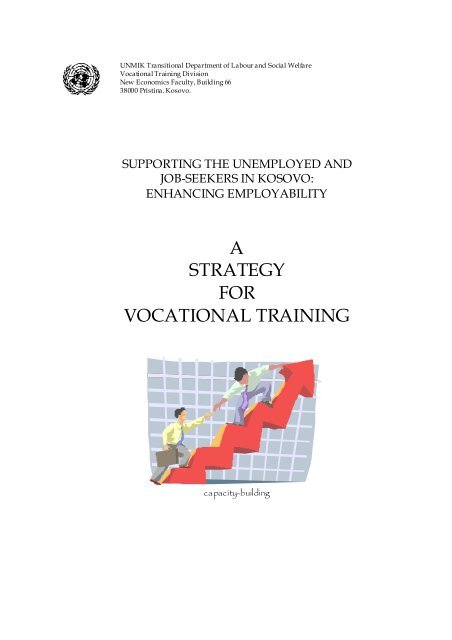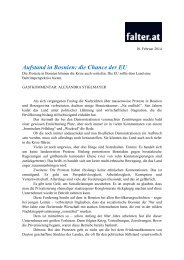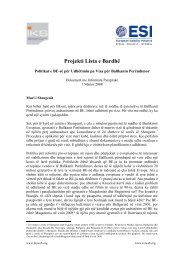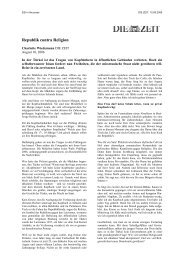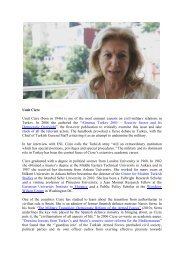A STRATEGY FOR VOCATIONAL TRAINING - ESI
A STRATEGY FOR VOCATIONAL TRAINING - ESI
A STRATEGY FOR VOCATIONAL TRAINING - ESI
You also want an ePaper? Increase the reach of your titles
YUMPU automatically turns print PDFs into web optimized ePapers that Google loves.
UNMIK Transitional Department of Labour and Social Welfare<br />
Vocational Training Division<br />
New Economics Faculty, Building 66<br />
38000 Pristina. Kosovo.<br />
SUPPORTING THE UNEMPLOYED AND<br />
JOB-SEEKERS IN KOSOVO:<br />
ENHANCING EMPLOYABILITY<br />
A<br />
<strong>STRATEGY</strong><br />
<strong>FOR</strong><br />
<strong>VOCATIONAL</strong> <strong>TRAINING</strong><br />
capacity-building
TABLE OF CONTENTS<br />
i. Contacts ………………………………………………………<br />
ii. Glossary ………………………………………………………<br />
iii. Summary ...……………………………………………………<br />
1. Introduction..…………………………………………………<br />
2. Objective ...…………………………………………………….<br />
3. Context ...……………………………………………………...<br />
4. Employment strategy ...……………………………………...<br />
5. Vocational Training Services ...……………………………..<br />
6. Constraints ...…………………………………………………<br />
7. Adult training – strategic objectives ...……………………..<br />
8. Vocational Training Centre Network ...……………………<br />
9. Cooperation and partnership ...…………………………….<br />
10. Statutory vocational service staff – capacity building ……<br />
11. Vocational Guidance Service ……………………………….<br />
12. Equity Issues …………………………………………………<br />
13. Social partners and vocational training ……………………<br />
14. From strategy to implementation …………………………..<br />
15. Conclusion ……………………………………………………<br />
3<br />
4<br />
5<br />
6<br />
6<br />
6<br />
8<br />
9<br />
10<br />
10<br />
12<br />
13<br />
14<br />
15<br />
16<br />
18<br />
19<br />
19<br />
2
CONTACTS<br />
For further information on the vocational training strategy for Kosovo and vocational<br />
training services in general, contact:<br />
Ylber Shabani<br />
Co-head of Vocational Training Division<br />
Transitional Department of Labour and Social Welfare<br />
UN Mission in Kosovo<br />
New Economics Faculty Building (Building 66, Office 4)<br />
38000 Pristina.<br />
Tel: +381 38 504 604 ext 6854<br />
Fax: +381 38 504 604 ext 6861<br />
Email: shabaniy@un.org<br />
or<br />
Danuta Mozdzenska-Mrozek<br />
Co-head of Vocational Training Division<br />
Transitional Department of Labour and Social Welfare<br />
UN Mission in Kosovo<br />
New Economics Faculty Building (Building 66, Office 4)<br />
38000 Pristina.<br />
Tel: +381 38 504 604 ext 6855<br />
Fax: +381 38 504 604 ext 6861<br />
Email: mozdzenska-mrozek@un.org<br />
Danuta Mozdzenska-Mrozek, Ylber Shabani, Anthony Gribben<br />
Vocational Training Division<br />
Transitional Department of Labour and Social Welfare<br />
UN Interim Administration in Kosovo<br />
Building 66<br />
38000 Pristina<br />
February 2002<br />
3
GLOSSARY<br />
DfID UK Department for International Development<br />
EAR European Agency for Reconstruction<br />
EBRD European Bank for Reconstruction and Development<br />
ETF European Training Foundation<br />
EU European Union<br />
ICT Information and communications’ technologies<br />
ISO International Organisation for Standards<br />
KCB Kosovo Consolidated Budget<br />
TDEST Transitional Department of Education, Science and Technology<br />
NGO Non-governmental organization<br />
SME Small and medium sized enterprise<br />
TDLSW Transitional Department of Labour and Social Welfare<br />
UNMIK United Nations Mission in Kosovo<br />
USAID United States Assistance for International Development<br />
VTC Vocational Training Centre<br />
4
SUMMARY<br />
Kosovo faces a number of challenges as it sets out to put its economy back on track<br />
after a decade of economic oppression and war that has had severe economic<br />
consequences for industrial outputs, agricultural production and infrastructure. And<br />
inheriting Europe’s worst unemployment scenario provides one of the principal<br />
challenges to the UNMIK administration and eventually the new Kosovo<br />
government to be established following central level elections in November 2001.<br />
This paper outlines the strategic framework for the vocational training of<br />
unemployed and job-seekers set against an employment strategy established by the<br />
Transitional Department of Labour and Social Welfare. The central aim of the<br />
training strategy is capacity building of the vocational training services while ensuring<br />
a training provision to meet immediate and urgent needs. It borrows on the<br />
principles and operations of the ‘employability’ pillar of European Union’s<br />
employment strategy.<br />
The strategy comprises 6 core areas each highlighting a number of key tasks/targets<br />
to be addressed. The core areas are:<br />
establishment and operationalisation of a network of adult training centres;<br />
partnership building and cooperation with non-statutory training providers;<br />
staff development measures for vocational services employees;<br />
introduction of a vocational guidance service;<br />
promoting equity in skills’ development;<br />
inclusion of social partners in vocational training developments.<br />
The strategy is purposely simple and flexible to allow for revisions, as appropriate,<br />
given possible changes associated with institutional, political, economic or financial<br />
support framework. It will be accompanied by an annual work programme to ensure<br />
implementation of the strategy to which all levels of the employment and training<br />
service, including relevant partners and stakeholders, will be engaged.<br />
The strategy covers the period 2002-2003.<br />
5
1. INTRODUCTION<br />
The paper identifies a number of strategic lines for the development and promotion<br />
of vocational training set against the TDLSW wider strategy and plans for<br />
employment development in Kosovo.<br />
The thrust of the strategy is primarily capacity-building – empowering the people,<br />
partners and officials directly engaged in manpower developments in Kosovo. In so<br />
doing, the strategy borrows particularly on the principle and concept of employability<br />
as a primary pillar within the EU’s employment strategy and towards which Kosovo<br />
will be required to evolve given the signals provided by the EU regarding integration<br />
of the countries of South Eastern Europe into EU structures 1 .<br />
That a Kosovo government is not in place at the time of writing and release of this<br />
paper, should not affect the spirit and objective of the strategy or its implementation.<br />
The strategy is intentionally simple and straightforward given the early phase of<br />
vocational training development (structures, policy frameworks and provision). It is<br />
also intended to be flexible to accommodate changes or developments (institutional,<br />
economic, political, financial) which could evolve and directly impact on the labour<br />
market and vocational training environment.<br />
The strategy provides a priority framework against which an annual operational<br />
plan will be drawn up, defining measures to be implemented - ensuring realisation<br />
of the strategy. It has a two-year time frame with pointers as to what are the key<br />
issues over the longer-term.<br />
2. OBJECTIVE<br />
The objective of the this paper to define a two year strategic plan (2002-2003) for the<br />
development of vocational training for the adult unemployed and job seekers in<br />
Kosovo.<br />
3. CONTEXT<br />
With an estimated unemployment rate of 50% 2 , a key challenge for the UNMIK<br />
administration (and to be carried forward to a Kosovo government in 2002) and<br />
economic operators in Kosovo is to establish the necessary support framework to<br />
promote enterprise creation, competitiveness and employment. This will involve the<br />
establishment of policies, structures and measures to ensure sustainable growth,<br />
skilled manpower and employment. A number of steps have already been taken in<br />
this regard.<br />
1 Feira European Council, June 2000.<br />
2 Estimated unemployment rate (February 2002), UNMIK Transitional Department of Labour and Social Welfare.<br />
6
Firstly, a regulatory framework for private sector development is now in place with<br />
particular emphasis being given to SME support structures where there is greatest<br />
employment potential. This is backed up with a wide range of financial support<br />
instruments to underpin the private sector development policies, in particular<br />
technical assistance and capacity building measures for SME development,<br />
supportive banking services and credit facilities 3 .<br />
Secondly, labour legislation has been introduced. This is essential in the bid to<br />
stimulate both domestic and foreign investment that will be crucial to economic turnaround,<br />
job creation and sustainable employment. Further, the decentralisation of<br />
administrative and financial responsibility for vocational training to regional level<br />
will allow for better connections to be established between the training centres,<br />
employment and education services, local employers and civic communities.<br />
Thirdly, a network of 7 adult training centres have been established across the<br />
Kosovo regions. These target job seekers and adult unemployed and provide training<br />
on a number of areas in response to labour market signals. The centres have been<br />
supported by bi-lateral funds but the medium term perspective is that these centres<br />
will be incorporated within the government’s employment and training services.<br />
Additionally, UNMIK education services have made a concerted effort to re-establish<br />
a vocational education provision within the school system. Emphasis has been placed<br />
on curriculum development and teacher training. Both the labour and education<br />
services of the UNMIK administration cooperate to ensure coherence and synergies<br />
in vocational training developments and services.<br />
Finally, a number of quick-start initiatives have been taken by international and<br />
resident NGOs, to promote employment and enhance skills’ required by the postwar<br />
economy. These have been driven, for the most part, by short-term, emergency<br />
considerations with little support for policies or measures to address the medium-tolonger<br />
term requirements for sustainable employment and manpower considerations<br />
of a new economy. The shift from emergency to development planning by the<br />
UNMIK administration will require a closer dialogue with the NGO partners,<br />
particularly in respect of vocational training provision, to ensure coherence and<br />
confidence of the Kosovo community, employers and wider business environment.<br />
3 Support for SME institutional support services and SME credits is provided by a range of organisations including the<br />
EAR for Reconstruction, EBRD, World Bank, USAID, UK DfID and a range of non-governmental organisations.<br />
7
4. EMPLOYMENT <strong>STRATEGY</strong><br />
Regulation No 2000/24 charges the labour administration with the formulation and<br />
implementation of policy aimed at supporting the unemployed by way of active<br />
employment policy measures such as job mediation, job creation, vocational training<br />
and re-training and small business development. 4 In response to these requirements,<br />
The UNMIK Transitional Department of Labour and Social Welfare has elaborated a<br />
Strategy for Employment and Labour Force Development whose ultimate aim is to<br />
achieve greater participation of the Kosovo population in the labour market. The<br />
necessary conditions for the increase of employment rate are both the creation of new<br />
jobs and implementation of policies encouraging people to economic activity.<br />
A critical requirement will be to raise the standards and market relevance of skills<br />
and wider human resources qualification potential.<br />
This main objective of the strategy for employment will be achieved through the<br />
following measures:<br />
improvement of employability through development of human resources;<br />
closer cooperation between enterprise development, labour market support<br />
and vocational training;<br />
improvement of employees’ adaptability to changing market conditions<br />
including in-company human resource plans;<br />
reinforcement of equal opportunities policy in the labor market with<br />
particular reference to minority and gender concerns.<br />
The measures borrow on the core pillars of the EU’s employment strategy. They are<br />
closely inter-related and create a coherent framework for social and economic<br />
development in Kosovo where employability and employment are the major<br />
objectives.<br />
The key target groups of the employment strategy are:<br />
semi-skilled and unskilled unemployed and particularly long-term<br />
unemployed;<br />
young unemployed (16–25 years), particularly youth requiring special<br />
support due to school drop-out;<br />
minorities with constraints to free movement as a consequence of the security<br />
situation;<br />
unemployed women who constitute almost 50% of the total number of<br />
unemployed;<br />
people with special needs (disabled, learning difficulties).<br />
enterprise employees where redundancy is a high risk.<br />
4 Regulation No 2000/24, Sec.2 para.2.2 c. The UNMIK Department of Labour shall also supervise the activity of<br />
Kosovo Office of Employment and its local affiliate employment offices and training institutions (sec.2 para 2.2 d).<br />
8
A particular concern for the labour authorities is the pending issue of restructuring of<br />
Kosovo’s enterprises and implications of workers. Training and re-training of those<br />
retained in industry and those made redundant will make a significant demand on<br />
the unemployment and training services. Further, knowledge and skills required to<br />
meet the demands of a growing service sector will require special consideration for<br />
skills to meet the requirements of the new economy.<br />
5. <strong>VOCATIONAL</strong> <strong>TRAINING</strong> SERVICES<br />
Vocational training is considered by the Transitional Department of Labour and<br />
Social Welfare as a core instrument of the employment services in promoting<br />
employability. Training delivered through a network of 7 training centres is<br />
complimented by other active employment measures provided by the Department<br />
and its network of employment offices: employment information, job placement and<br />
vocational counselling.<br />
Training is provided to the unemployed and job seekers who have passed<br />
compulsory school age.<br />
Effectiveness of training courses for the unemployed and job seekers depends on the<br />
proper identification of the local labour market needs to ensure that training<br />
curricula meets the requirements of employers. Given that labour market needs will<br />
change in the medium to long term and will continue to evolve in line with market<br />
trends, a systematic labour market monitoring system, involving the local<br />
employment offices in close interface with local employers will be an essential<br />
feature in training policy, design and delivery.<br />
This inter-relationship between labour market monitoring, training, job counselling<br />
and placement calls for a close cooperation between the employment and training<br />
services and its key partners. The key partners are: employers, employees<br />
organisations, municipal authorities, civic organisations, private training providers<br />
and the education authorities 5 . This cooperation between the partners will be a<br />
keystone to Kosovo’s strategy in promoting employment and quality skills of its<br />
workforce.<br />
5 The Transitional Department of Labour and Social Welfare has established a memorandum of understanding with the<br />
Transitional Department of Education, Science and Technology. This defines cooperation between the Departments<br />
on vocational training provision and facilities.<br />
9
6. CONSTRAINTS<br />
A number of limitations presently exist and will need to be addressed in order to<br />
ensure that an effective adult training service is in place to meet Kosovo’s<br />
employment and skills’ requirements.<br />
Firstly, demand for services outweighs provision available, in particular for those<br />
unemployed and job seekers who are unskilled (54%) or semi-skilled (6%) 6 .<br />
Secondly, training structures, personnel and infrastructure, both public and private,<br />
are not sufficient to ensure quality services for adult unemployed and job-seekers.<br />
Thirdly, data on labor market qualifications needs at local, regional and central level<br />
is unreliable and requires significant support to allow for policy development and<br />
targeted measures to meet evolving demand associated with economic change in<br />
Kosovo.<br />
Fourthly, the physical conditions of local employment services, staff competencies<br />
and materials resources, including vocational services and staff within the<br />
employment offices, are below a standard to allow for a normal functioning service.<br />
Finally, and related to quality and availability of resources (infrastructure, human) is<br />
the financial constraint within the Kosovo Consolidated Budget (KCB) to foot the bill<br />
to address the existing constraints, at least in the short-to-medium term.<br />
7. ADULT <strong>TRAINING</strong> - STRATEGIC OBJECTIVES<br />
Set against the various institutional, material, human and financial constraints, the<br />
Transitional Department of Labour and Social Welfare, has prioritised a number of<br />
development objectives:<br />
training centre network: establishment of a stable network of vocational<br />
training centres anchored in the network of employment offices;<br />
cooperation: development of stable mechanisms and forms of co-operation<br />
with and between training providers, particularly in the NGO community to<br />
ensure compatibility between their training offers and labor market demand<br />
and promote a coherent structure for quality and recognition of<br />
qualifications;<br />
capacity-building: creation of a stable structure of employment offices staff<br />
dealing with vocational training issues, including capacity building of all<br />
vocational service staff: regional vocational training coordinators, local<br />
training and vocational guidance advisors;<br />
6 Labour market developments in Kosovo. Kosovo Office of Employment. Transitional Department of Labour and<br />
Social Welfare. February 2002. p.3.<br />
10
vocational guidance: introduction and development of a vocational guidance<br />
service within the employment offices system with the necessary linkages to<br />
partners in the world of work;<br />
equity: economic and social inclusion is central to the strategy’s objective.<br />
Assuring access to training and jobs for all communities in Kosovo requires<br />
further reflection, including a shift from policy and measures which reinforce<br />
ghettoisation of minority groups (community-specific projects) to addressing<br />
longer-term, cross community cooperation on employment and skills; gender<br />
issues will continue to feature in monitoring, reporting and training access;<br />
social partnership: development of co-operation with social partners on<br />
central, regional and local level in order to achieve the higher effectiveness of<br />
training courses delivered by different training providers, including linkages<br />
within South Eastern Europe region, European Union and wider<br />
international environment.<br />
Each objective borrows on principles and approaches for development and<br />
sustainability of modern vocational training systems within market developed<br />
economies and in particular the European Union, towards which Kosovo will be<br />
expected to evolve in line with the Stabilisation and Association process being<br />
established between the countries of the South Eastern Europe and EU 7 .<br />
The vocational training strategy will be operationalised within an annual work<br />
programme with clearly identifiable and measurable outputs. For the purposes of<br />
this strategy paper, each of the priority areas are considered in terms of immediate<br />
term (24 months) concerns and measures with perspectives/pointers up to 5 years<br />
which will be a function of political stability, success in the economic transition<br />
process and capacity of the structures to support the reform effort in administrative<br />
and financial terms.<br />
7 EU Summit. Zagreb. 24 November 2000<br />
11
8. <strong>VOCATIONAL</strong> <strong>TRAINING</strong> CENTRE NETWORK<br />
The key priority for the TDLSW vocational training division is to reinforce and<br />
ensure sustainability of the fledgling network of adult vocational training centres<br />
(VTCs) to ensure an availability of training to meet skills requirements of the local<br />
economies. The network, comprising 7 training centres, has been established with the<br />
support of Italian and Danish bi-lateral funds 8 .<br />
Short-medium term (2002-2003) objectives<br />
sustainability of training centre network: phasing in of network of 7<br />
vocational training centres within the Department’s administrative,<br />
management and financial framework (employment offices) with gradual<br />
disengagement of donors;<br />
capacity building: training of trainers employed at the centres (delivery in<br />
Kosovo, regional, international training) for specific training courses;<br />
development of curricula borrowing on best practice, knowledge and triedand-tested<br />
methodology (e.g. modules of employable skills);<br />
target groups: formulation of selection criteria and delivery process<br />
(appraisal, testing, job-counselling, placement, follow-up) for young<br />
unemployed, long-term unemployed, minorities, refugee returnees and excombatants;<br />
delivery: development and delivery of at least 4 training courses within each<br />
vocational training centre;<br />
extension: opportunities to widen the training centre network will be<br />
explored with donors with particular reference to training delivery in<br />
minority districts;<br />
interim certification: creation of a formal but interim certification system of<br />
certification for adult training provision, in cooperation with the TDEST to<br />
ensure standards, quality control and recognition.<br />
Longer term perspective<br />
creation of a demand-driven occupational classification system in<br />
cooperation with partners from the region;<br />
develop data collection and labour market research on the links between<br />
labor market and qualification needs, especially at regional and local level;<br />
to launch a mechanism of flexible circulation of curricula, training staff and<br />
equipment/mobile training around the network of VTCs;<br />
develop training courses according to the changeable labor market needs.<br />
8 Adult training centres are located at Mitrovica South, Gjilan, Gjakova, Ferizaj, Peja, Prizren, Pristina.<br />
12
7. COOPERATION AND PARTNERSHIP<br />
A significant number of training providers started up operations in Kosovo after the<br />
cessation of conflict in 1999. These were primarily international NGOs and latterly<br />
local NGOs and private training providers. Now shifting from emergency to<br />
development strategy, the Transitional Department of Labour and Social Welfare has<br />
a number of concerns regarding non-statutory training provision for the unemployed<br />
and job-seekers, in particular:<br />
quality of training being delivered;<br />
relevance and applicability of training vis-à-vis real labour market needs;<br />
general public, and particularly, employer confidence in content and<br />
standards of training delivered;<br />
how training will be certified and recognised.<br />
Short-medium term (2002-2003) objectives:<br />
dialogue and partnership: dialogue and development of inter-departmental<br />
plan with vocational education services of Transitional Department of<br />
Education, Science and Technology (TDEST) to determine common strategy<br />
and mechanisms for cooperation and partnership with non-statutory<br />
vocational training provision;<br />
intelligence build-up: mapping and registration of all significant vocational<br />
training providers operational in Kosovo, including the establishment and<br />
maintenance of live database for information and monitoring purposes;<br />
consultation framework: establishment of local training councils consisting of<br />
key stakeholders in vocational education and training area (education and<br />
training authorities, training providers, social partners, civic interest groups)<br />
with clear terms of reference to ensure coherence of non-statutory training<br />
provision with local labour market requirements, interface with statutory<br />
services (education, training, employment support services) to guard against<br />
duplication of resources and effort;<br />
guiding principles: development of guidelines for non-statutory vocational<br />
training providers with the objective of counteracting deregulation of local<br />
labour market by over-supply of occupational specific skills.<br />
Longer-term perspective<br />
establishment of a professional certification system in cooperation with the<br />
TDEST for vocational education and training based on a Kosovo classification<br />
and vocational standards set against regional and international norms e.g.<br />
ISO 9000.<br />
13
10. STATUTORY <strong>VOCATIONAL</strong> STAFF: CAPACITY BUILDING<br />
A key priority for the TDLSW is to develop the knowledge and skills of the staff<br />
directly contributing to vocational training services. The primary target groups will<br />
be those staff working at the coalface: a) regional vocational training coordinators<br />
and vocational trainers, b) local training advisors and vocational guidance advisors<br />
located in the municipal employment offices.<br />
However, the planning for training of statutory staff involved in vocational training<br />
provision and support services will include the awareness raising and training needs<br />
of the key counterparts to the vocational training process in order to have real value.<br />
Hence, inclusion of key stakeholders as counterparts to a modern vocational training<br />
service will be imperative.<br />
Improving the effectiveness of the training of unemployed and job seekers leading to<br />
the enhancement of their employability constitutes the primary task recommended<br />
by TDLSW to the employment offices. It is also essential to instruct and encourage<br />
training providers to improve the quality of their training courses. These goals<br />
should be implemented through vocational training service staff (regional VTCs,<br />
vocational training advisors) and counterpart stakeholders established as teams<br />
addressing a number of core functions:<br />
development and programming of vocational training for unemployed and<br />
job seekers;<br />
curriculum design, training and re-training of instructors based on solid<br />
labour market signals;<br />
selection of candidates from pre-defined client groups for training<br />
programmes, training process and follow-up;<br />
liaison, planning and coordination on training with employers vis-à-vis<br />
training of unemployed and job seekers 9 .<br />
Short-medium term (2002-2003) objectives<br />
The primary staff capacity building issues to be addressed in the immediate term are as<br />
follows:<br />
Creation of special teams of vocational training organizers located within the<br />
employment services on two levels:<br />
o regional level: 7 Vocational Training Coordinators (one per Regional<br />
Employment Office) and trainers delivering training courses for<br />
unemployed and job seekers within the regional adult training centres.<br />
o local level: 22 Employment and Training Advisors (one officer per<br />
Municipal Employment Office) responsible for identification of training<br />
institutions/agencies and selection of unemployed for training courses.<br />
fast-track training on key concepts and issues of labour market and training<br />
issues within market economies and in particular employment and<br />
qualification needs’ data collection, categorisation, analysis and reporting 10 ;<br />
9 Support well also be provided for re-training/upgrading of skills of those already employed but constraints on<br />
finances and priority given to primary target groups.<br />
14
egular and systematic training by way of workshops, exposure visits,<br />
information events will additionally support job mediation and training<br />
courses assuming availability of donor funds;<br />
monitoring and evaluation of effectiveness of training courses and impact on<br />
employment rates.<br />
Longer term perspective<br />
the staff complement within the municipal employment offices dealing with<br />
vocational training will increase from 22 to 44 employees (5 years). Staff<br />
preparation and training both at local and regional level to ensure knowledge<br />
and skills required for operations;<br />
establishment of a stable mechanism of co-operation between employment<br />
offices, employers and training providers through supply-demand side<br />
stakeholder meetings, training courses exchange and regional and local<br />
councils of employment and training.<br />
11. <strong>VOCATIONAL</strong> GUIDANCE SERVICE<br />
To ensure vocational training and training courses for the unemployed and job<br />
seekers are well adapted to market demands it is necessary to operate an efficient<br />
and relevant vocational guidance system. The TDLSW will seek in its work to<br />
develop vocational guidance through the network of employment offices for the<br />
unemployed and those at risk of unemployment. This will be of particular<br />
significance given the context of restructuring and privatisation of socially owned<br />
enterprises.<br />
What is particularly called for is the professional support of vocational advisors in<br />
counselling and guidance of the jobless and those facing redundancy vis-à-vis<br />
retraining opportunities, adult education options and existing and upcoming job<br />
market vacancies and requirements to close the gap between existing skills, skills<br />
required and employment vacancies.<br />
The introduction of a vocational guidance system requires a special effort to create a<br />
group of specialists with the necessary professional skills and tools indispensable for<br />
delivering vocational counselling to unemployed and job seekers. The establishment<br />
of a vocational guidance system may be conceived across two phases:<br />
Short-medium term (2002-2003) objectives<br />
creation of specialist team of vocational counsellors within the network of 29<br />
regional and municipal employment offices;<br />
intensive training of vocational counsellors by national and international<br />
experts (training courses should be of both short duration and more strategic<br />
knowledge and skills development over the medium to long term);<br />
10 Pilot action supported by ETF.<br />
15
equipping employment offices with the necessary tools, testing materials and<br />
information required for the administration and delivery of a modern<br />
vocational guidance system.<br />
Longer-term perspective<br />
Based on field work experience and exposure of systems and methods of<br />
vocational guidance from the region, EU and wider international<br />
environment, adoption of a professional vocational guidance framework for<br />
Kosovo;<br />
creation of Vocational Guidance and Information Centres network anchored<br />
in the network of employment offices;<br />
full implementation of vocational guidance methods for individual and<br />
group vocational counselling;<br />
establishment of occupational profiles and a Kosovo-based classification of<br />
vocations;<br />
preparation and dissemination of vocational guidance and information<br />
through Vocational Guidance and Information Centres and education<br />
system.<br />
12. EQUITY ISSUES<br />
Minorities, majorities and jobs<br />
A critical issue for Kosovo is ensuring equal access to employment and training for<br />
minority communities. TDLSW has a policy to provide equal rights and services<br />
(unemployment registration, job counselling and training) to Kosovo Albanians and<br />
non-Albanians, notably Serbians, who are in a more vulnerable position in the labour<br />
market because of security and freedom of movement concerns 11 .<br />
Special efforts have been made by the training services to meet demand for<br />
vocational training by Serbian communities, particularly 12 . However, real impact has<br />
been extremely localised and a continuation of community-specific projects runs the<br />
risk of institutionalising division and segregation. Efforts are now needed to address<br />
a longer-term perspective of cross-community building where employment and<br />
skills’ development are a feature in promoting tolerance and co-existence.<br />
The intention of the TDLSW is to examine the feasibility of projects of mutual<br />
advantage where employment creation and manpower developments are the overriding<br />
objective for the various parties signing up to an initiative. The Department<br />
proposes to dialogue with donors regarding the establishment of at least two, high<br />
profile employment/skills’ development projects where inter-community<br />
cooperation will be a central and conditional feature.<br />
11 Equal access issues for workers are covered by UNMIK Regulation No2001/27 on Essential Labour Law in Kosovo (8<br />
October 2001).<br />
12 For example, Gjilan Regional Training Centre is considering e stablishing a ‘satellite unit’ in the Serbian enclave of<br />
Strpce while negotiations have been concluded with the municipal administration of North Mitrovica (focus of<br />
community division and regular flash-point) on opening a new adult training provision.<br />
16
Given that security remains a barrier to an effective cooperation project, the<br />
department proposes to develop a cross-community information and<br />
communications’ technologies (ICT) skills development forum where common<br />
planning, decision-making, communications and cooperation will be virtual, backed<br />
up with well-planned cooperation exercises held outside of Kosovo (possibly host<br />
countries of donor organisations) 13 .<br />
The projects will be incentives-driven. ICT skills’ investment in participating<br />
communities, coupled with an international framework to the projects, will go some<br />
way to engaging interest. The projects will be selected following an open and<br />
transparent competition. Preparatory technical assistance funding will be made<br />
available to all interested parties in developing project proposals and finding<br />
partners, in association with other stakeholders promoting tolerance building in<br />
Kosovo.<br />
The odds of success may not be as high as with standard skills’ development projects<br />
but should there be some commitment on the Kosovar side to try, the authorities and<br />
donors should back it.<br />
Gender<br />
To promote a better integration of women into jobs, TDLSW has introduced specific<br />
training courses for women in 3 regions (Pristina, Peja and Prizren). More effort will<br />
be needed to fully address women’s access to jobs (training, vocational<br />
guidance/counselling, awareness raising amongst employers) but regular reporting<br />
by the local employment offices on their activities on gender (and minority) issues<br />
will establish baseline data/indicators as to how gender employment/training<br />
concerns can be more effectively addressed.<br />
Special Needs<br />
A Working Group on Employment and Training of Disabled has been established by<br />
the TDLSW. Its task is to develop a comprehensive policy framework for people with<br />
special needs. Key objectives are:<br />
define the terminology according to international terms and definitions used<br />
and accepted by people with special needs and wider society;<br />
prepare classification of people with special needs and criteria for assessing<br />
their ability to work;<br />
develop recommendations for respective institutions responsible for<br />
enhancement of the employability of people with special needs.<br />
A wider ‘disability’ task force has called for legislation to be introduced to ensure<br />
equal access to training and jobs for people with special needs, in line with special<br />
provisions already existing for to promote equal opportunities for minorities and<br />
women.<br />
13 Experience and technical cooperation with projects in other post-conflict countries addressing employment and skills’<br />
development will be examined.<br />
17
13. SOCIAL PARTNERS AND <strong>VOCATIONAL</strong> <strong>TRAINING</strong><br />
Social partner involvement in the development of vocational training is weak.<br />
Employers’ organisations, apart from the Chamber of Commerce, do not exist while<br />
interest of employers in vocational training is bare. Given that private sector<br />
development is still very much in a primary phase with a vibrant SME community,<br />
energy here is concentrated on keeping the businesses running. Engaging the SMEs<br />
as a group into dialogue on labour market and training developments will take time.<br />
Secondly, the trade union movement is extremely weak and will require significant<br />
capacity building to assume the functions of effective partner in the labour market<br />
and vocational training reform effort.<br />
Consequently, until the structures and organisation of the social partners are<br />
sufficiently established and financial and technical resources are available to assist<br />
with capacity building of the partners, efforts to develop awareness and contribution<br />
of the social partners to vocational training reform and modernisation will be very<br />
primary and project oriented.<br />
Short-medium term (2002-2003) objectives<br />
co-operation with external training providers on the regional and local level;<br />
development of the cooperation on training developments at local level;<br />
joint discussions with Transitional Department of Trade and Industry and<br />
enterprise representatives (managers, workers councils) regarding<br />
implications of enterprise restructuring for labour market, including retraining<br />
implications for workers within the enterprises as well as those<br />
facing unemployment.<br />
Longer-term perspective<br />
co-operation with education authorities (Education Boards within Regional<br />
and Municipal Administration), school and civic interest organisations on<br />
training developments and provision;<br />
monitoring and evaluation of training provision to include the assessment of<br />
training by social partners<br />
monitoring and advice to Tri-partite Council on employment and skills’<br />
development agenda as part of wider social dialogue framework.<br />
18
14. FROM <strong>STRATEGY</strong> TO IMPLEMENTATION<br />
The training strategy will be realised by way of a series of operational measures for<br />
each of the six core areas.<br />
An annual work programme detailing the operations to be carried out for the twoduration<br />
of the strategy will be developed and measures implemented. Progress on<br />
the realisation of the strategy will be assessed after the first year and the strategy<br />
revised according to progress or constraints, as appropriate. This will be followed<br />
by the second annual work programme. A new strategy building on the<br />
achievements from 2002/2003 will be elaborated in 2004 for a pre-defined period.<br />
15. CONCLUSION<br />
With the worst unemployment record in Europe and a static economy, getting<br />
Kosovo back to work is a serious challenge for UNMIK and for a Kosovo<br />
government when in place. While efforts are being made to kick-start the economy<br />
ensuring that the necessary skills are available to support employers’ requirements is<br />
a primary concern of the Kosovo labour authorities.<br />
This vocational training strategy is drawn up for a 2 year period only (2002-2003) to<br />
enable the relevant services and partners engaged in the reform process to set<br />
realistic objectives to enhance employability in Kosovo set against an uncertain<br />
political, institutional and economic environment.<br />
The strategy is essentially one of primary institution building. The task is to put in<br />
place structures that will support the training system, including the people who will<br />
administer and deliver the training. And, as with most other developments in<br />
Kosovo, the strategy will rely on the good will and support of local stakeholders and<br />
international community to see through the various measures that will be conditional<br />
upon financial inputs, particularly.<br />
The strategy recognises the need for linkages, cooperation and partnership with the<br />
key stakeholders to vocational training and engages the partners into the early days<br />
of vocational training development. And it puts the employment and training needs<br />
of minority communities centre-stage giving full recognition to cross-community<br />
building while ensuring that other key target groups are held in focus – youth, longterm<br />
unemployed, women and people with special needs.<br />
To sum up the strategy is inclusive. The expectation of the TLDSW is to establish a<br />
basis for sound cooperation and joint effort amongst the key stakeholders in the long<br />
term to promote sustainable employment, skills and economic competitiveness in a<br />
Kosovo where all citizens and communities stand to gain.<br />
19


